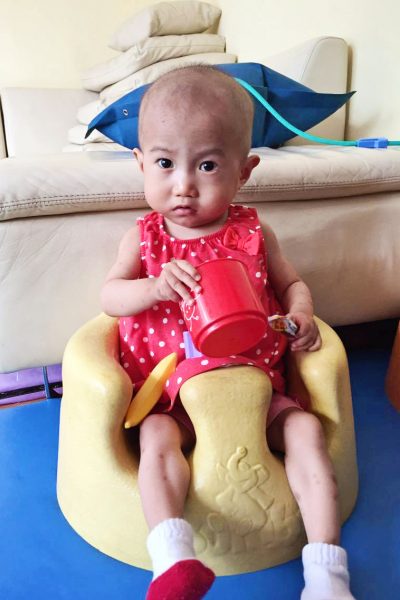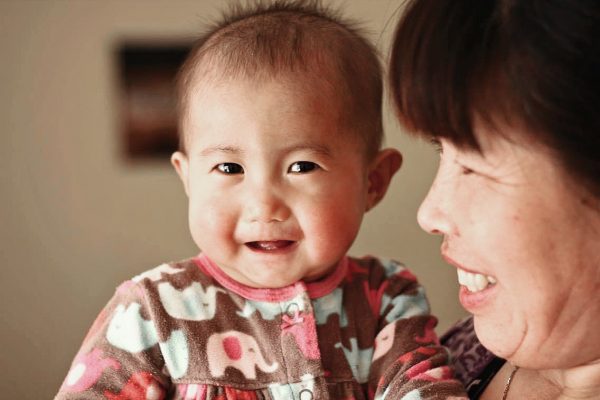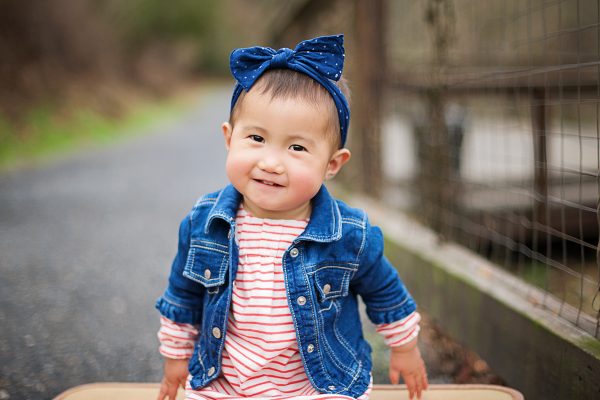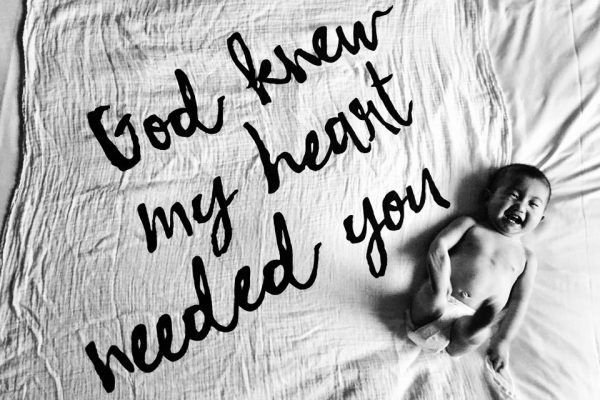………
After adopting our first daughter from China in April of 2015, we knew that we would eventually be headed back to adopt again. Our eyes had been opened, our hearts were aching for orphans, and we would never be the same.
In July of 2016, we made the decision to get the ball rolling on adoption number two. My husband and I assured each other repeatedly that we planned to take this adoption process slow.
We laugh about that now.
Less than a week after we contacted our home study agency, a picture of her appeared in my Facebook feed. I had seen posts about her in advocacy groups previously, but in that moment, I knew I needed to pursue her.
We asked to view her file. She was 18 months old, and listed as having congenital heart disease and a handful of other medical needs. We looked at pictures, watched videos and made our way through pages of medical information. We sent out emails, asking cardiologists if they would be willing to look over her file for us. Within an hour, we had reports back from multiple cardiologists outlining a range of potential prognoses.
Although there were still unknowns, one thing became very clear to us that morning:
this was our daughter, and she desperately needed us to fight with all we had to get her home.
So here I was, suddenly thrust into what I had always seen as the terrifying world of parenting a child with heart disease; and, as we suspected at the time and have now confirmed, parenting a child with a genetic syndrome. These were the parents I admired, the parents I aspired to be; their strength and resolve seemed supernatural at times.
It wasn’t that I was ever against pursuing a child with heart disease or genetic syndromes; I just wasn’t convinced that I had what it would take.
My hesitation was not born out of inexperience with the tough realities of this life. By age thirty, I had lost my dad to brain cancer, had been the victim of a terrifying crime, and had fought my own share of medical battles. I see now that, in many ways, I was afraid I was too broken. Too beaten down by life. Too afraid of more pain, more heartache, more hard. Instead of seeing these experiences as formative and life-giving, I saw them as crippling.
Through our first adoption, God began to change my heart. He began to soften me and to break down the walls that I had built up over the years. It’s hard to effectively parent a child with unique attachment needs when you are trying to shield yourself from the world; it’s even harder to maintain those shields through the realization that this child has already experienced more heartache and trauma than you ever will. She deserved all of me, and she slowly chipped away at my walls from the day she sank into my embrace in a cold orphanage in Tianjin, China.
Still, barriers remained. The day we said yes to Rosie, God began to pour into me exactly what he knew it would take to raise her. He also began to show me that those tough roads I had walked before were not in vain. The hard? The heartache? All that pain? It was all coming together. I began to see that by running straight toward the things that I thought I simply could not handle, my broken and weary heart became strengthened and resolute.
And then, the final walls began to fall the day we received this message:
“Hey there — just wanted to reach out. I run Morning Star Foundation in Beijing — a home for heart babies. I think your daughter is being transferred our way on Tuesday.”
Before we began Rosie’s adoption, she had a team of people who were rallying for her. Worried about her health due to the delay in her treatment, our agency had been working for several months to get her transferred to a medical foster home. She was in a rural orphanage that lacked the financial resources to get her the medical care she desperately needed. We tried to remain hopeful, but realistically, it didn’t seem like it would happen.
I was incredibly worried about Rosie’s health at that point. My determination to get to her was like nothing I had ever felt before. Something was wrong. I knew in my heart she was not doing well. I prayed. I cried. We completed forms and appointments, but nothing seemed to move fast enough. At the time, we were told we could expect to travel in 5-6 months, if we were granted a medical expedite.
(We ended up being granted an expedite and leaving for China exactly 4 months later.)
And then, we received that very first message from Meredith Toering. Although I had heard of Morning Star and knew of the amazing work this foster home was doing in China, I never imagined that one day our worlds would collide as we joined hands to fight for Rosie’s life.

The original plan for Rosie’s time at Morning Star was to learn more about the condition of her heart and begin treatment for pulmonary hypertension, getting her on track for surgery as soon as we got home. That plan changed quickly when she arrived and it was clear that she was seriously malnourished. Meredith and her amazing team of nannies were determined to get her healthy, and people from all over the world donated money to help provide her with high calorie formula.
And so Rosie’s beautiful transformation began. Within days of arriving, she began to grow. She began to smile. She began to accept and radiate the love that Morning Star was pouring into her every single day. When we got word of her poor health, we experienced a storm of conflicting emotions, but the overriding feeling was one of hope.

Rosie’s time at Morning Star was quite possibly lifesaving for her, and I truly believe it was transformational for me as well. I learned of and witnessed some of the most selfless, beautiful acts of service and love. It challenged me and changed me, to see these people who had experienced immense pain and heartache, who then chose to dive right back into it time and time again.
They weren’t running away. They weren’t building walls, though heaven knows they may have wanted to at times. They knew what it was to fight with all they had and still experience loss. Yet they continued to open the door to their home to welcome in more.

I realized that the kind of hope they were clinging to was the very thing I lacked after so many years of building walls.
At the beginning of last summer, I read a quote that said “Try staying open when you want to shut down. It changes everything.” At the time I wasn’t really sure why it resonated with me so strongly, but I cut it out and tacked it to the wall over my desk. What I came to realize through Rosie’s adoption process is that, in response to past heartache, I had learned to shut down when faced with situations that could potentially lead to more pain.
But this time God was determined not to let me miss out, and when I allowed him to lead me straight into the fire, the blessings were overwhelming.

It has not been easy, and with only a few days left before Rosie’s open heart surgery, we have plenty of hard still ahead, but the peace that has come from stepping out in hope instead of cowering in fear has changed me forever.
– guest post by Kaitlyn

























BEAUTIFUL!!
This is so beautiful! Thank you for sharing your heart and story.
You never know when your story will help another person through their own fire. Sometimes the inspiration is that enormous. Thank you for sharing Rosie’s story – and yours. May your blessings continue.